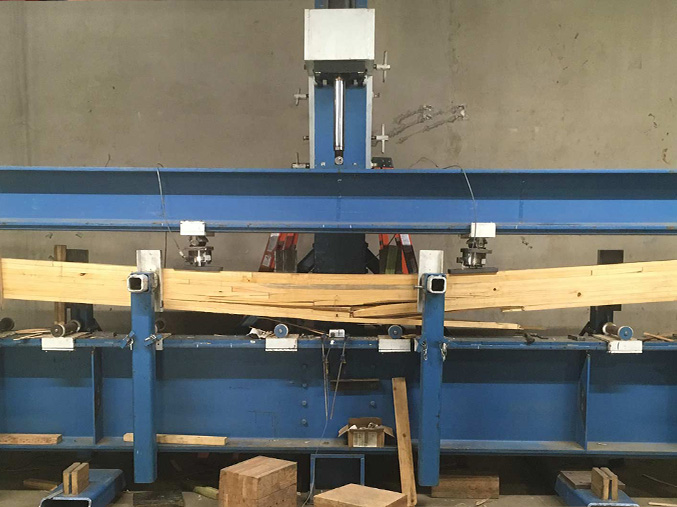Wood & Timber Testing
In the realm of building and infrastructure testing, wood and timber are integral materials used in construction. The quality and performance of these materials directly influence the durability, safety, and environmental impact of structures such as buildings, bridges, and roads. Wood and timber testing is essential to ensure that the materials meet specified standards for strength, durability, and compliance with local regulations.
The process begins with proper sample preparation, which involves selecting representative specimens from the batch or shipment. These samples are then subjected to various tests designed to assess their mechanical properties, such as compression, bending, and shear strength. The testing equipment used includes universal testing machines (UTMs) capable of applying precise loads while measuring deformation, stress-strain relationships, and failure modes.
Another critical aspect is moisture content analysis, which can vary significantly depending on the environment in which wood products are intended to be used. Accurate measurement ensures that the material will perform optimally under different conditions, avoiding issues like warping or rot. For this purpose, we use infrared moisture meters and oven-dry methods.
Compliance with international standards is crucial for ensuring product quality and market acceptance. Notably, ISO 15107-2:2018 provides guidelines for the determination of modulus of rupture and modulus of elasticity in prismatic specimens, while ASTM D1936 covers moisture content measurement using gravimetric methods.
Our laboratory follows these standards rigorously to provide accurate and reliable test results. By adhering to international best practices, we ensure that our clients receive high-quality testing services that meet the highest industry standards. This commitment to precision and consistency is vital for maintaining trust in the construction sector.
The importance of wood and timber testing cannot be overstated. It ensures that structures are safe, durable, and environmentally sustainable. By conducting thorough tests on wood products, we help our clients make informed decisions regarding material selection and specification, ultimately leading to better-designed buildings and infrastructure projects.
Benefits
The benefits of wood and timber testing extend beyond mere compliance with regulations; they offer substantial advantages for quality management, compliance officers, R&D engineers, and procurement teams. By ensuring that materials meet specified standards, these tests enhance the overall performance and safety of structures.
For quality managers, regular testing provides critical data on material consistency, enabling them to maintain high-quality standards throughout production processes. Compliance officers benefit from detailed reports that demonstrate adherence to regulatory requirements, reducing legal risks associated with non-compliance.
R&D engineers can leverage test results to innovate and improve product designs, optimizing performance while meeting sustainability goals. For procurement teams, accurate testing ensures they source materials from reliable suppliers who consistently meet quality benchmarks.
Moreover, wood and timber testing supports environmental stewardship by promoting the use of sustainable practices. By ensuring that only high-quality, responsibly sourced wood is used in construction projects, we contribute to long-term ecological balance.
Customer Impact and Satisfaction
The impact of rigorous wood and timber testing on customer satisfaction cannot be overlooked. Our clients benefit from the peace of mind that comes with knowing their materials meet stringent quality standards. This assurance translates into satisfied customers who can trust in the performance and longevity of the structures they build.
For project managers, reliable test results mean fewer delays due to rework or replacement of substandard materials. The data provided by our tests helps them make informed decisions that enhance overall project efficiency and success.
Our focus on customer satisfaction is reflected in our commitment to providing accurate, timely, and comprehensive reports. By delivering these insights promptly, we enable clients to address any issues early in the design or construction process, thereby minimizing costs and improving outcomes.
International Acceptance and Recognition
The international acceptance of wood and timber testing is a testament to its importance within the global construction industry. Our laboratory adheres strictly to internationally recognized standards such as ISO 15107-2:2018 for modulus of rupture and modulus of elasticity determination, ensuring that our test results are universally accepted.
By aligning with these benchmarks, we ensure that the materials we test meet not only local but also global quality expectations. This alignment is particularly important in projects involving international collaborations or export markets where compliance with foreign standards is necessary.
The recognition of our testing services extends beyond mere adherence to standards; it encompasses the expertise and reputation we have built over years of service. Clients trust us to provide accurate, reliable data that supports their strategic business goals. This trust translates into long-term partnerships and repeat business.





